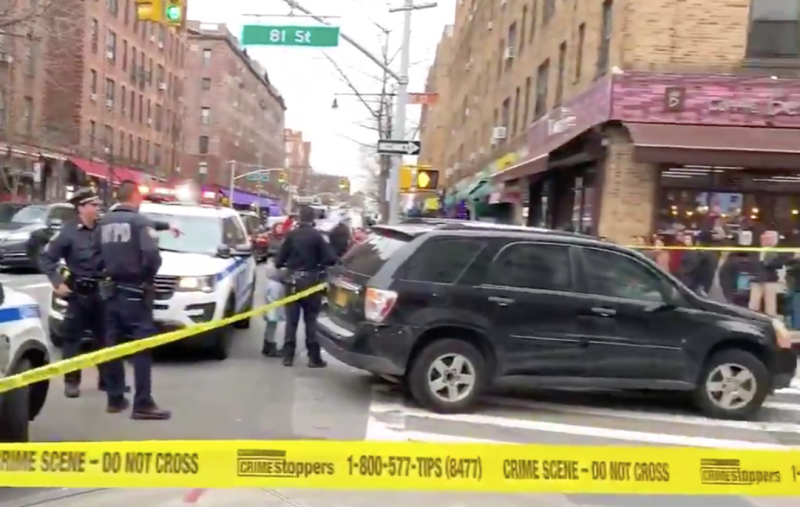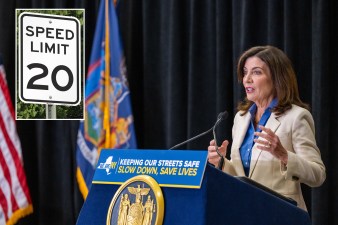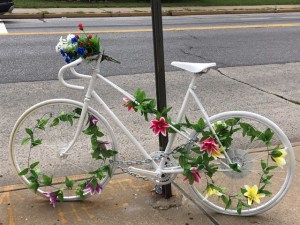Gov. Hochul Signs Law Adding Cyclist and Pedestrian Safety Awareness to Driver’s License Requirements

New drivers for the first time will be tested on their knowledge of pedestrian and cyclist safety as a part of the requirements for obtaining a license in New York, according to a law that the governor signed Friday.
Gov. Hochul signed into effect a law that “will require new drivers to learn about pedestrian and bicyclist safety awareness as a component of the pre-licensing exam and as a prerequisite for obtaining a license to operate a motor vehicle.” The law fixes a longtime, glaring oversight in driver education, which had unleashed generations of motorists onto the roads who had little awareness of the need for road-sharing with pedestrians and cyclists and even less knowledge of the laws and rules for doing so.
“My top priority as Governor is to keep New Yorkers safe, and it is common sense to make pedestrian and bike safety education mandatory for drivers,” said Hochul. “This law will help prevent crashes and save lives, and I thank my partners in the Assembly and Senate for passing this legislation to make our streets safer.”
The bill was shepherded through the Assembly by Emily Gallagher (D-Brooklyn) and carried through the state Senate by Andrew Gounardes (D-Brooklyn), who introduced the measure in 2019. Gounardes noted that even as the streets had changed drastically, with an explosion of bicycling and micro-mobility use, driver education hadn’t changed with the times.
“The instructions and the driving test haven’t been updated to reflect the reality that our roadways are shared spaces,” Gounardes said, recounting the 2019 crash that killed 3-year-old Emur Shavkator of Brooklyn, who was mowed down by a delivery truck driver who passed a stop sign without checking for pedestrians.
Hochul’s signature means that the syllabus for the state’s five-hour driver-education course and official driver’s manual will be updated beyond its current brief mentions about how drivers must conduct their vehicles in the presence of cyclists and pedestrians. Now, the DMV syllabus merely advises driving instructors to point out the relevant passages in the state’s driver’s manual if students happen to ask how they’re supposed to navigate in the presence of cyclists or pedestrians.
The manual, which prospective drivers must read in order to pass their road test, devotes only 264 words on to how to safely operate a car around pedestrians and only 187 words to safe driving around bicyclists. Those words are as follows:
Bicyclists and in-line skaters have the right to share the road and travel in the same direction as motor vehicles. They are often hard to see in traffic and have no protection from a traffic crash. Check your “blind spots” before you make a turn, parallel park, open a door or leave a curb. Do not depend only on your mirrors – turn your head to look for bicyclists, skaters and scooter operators that may be next to you or approaching.
Give bicyclists and in-line skaters room when you drive. Reduce speed as you pass them. Air pressure from a vehicle that passes them quickly can send them off balance.
Be aware that the bicyclist or in-line skater near or in front of you can react to road hazards with sudden changes of speed, direction or lane position.
The rules of the road and right-of-way apply to and protect these and other highway users. You must yield the right-of-way to them just as you would to another vehicle. And they must obey the rules of the road just as motor vehicle drivers do.
Driver inexperience isn’t the only reason behind injury-causing crashes in the state and city, but it still has a big effect. In 2021, the city experienced 110,333 crashes, including 36,728 crashes that caused an injury or fatality. “Driver inexperience” was listed as a factor in 2,513 of those crashes, more than “alcohol involvement,” “aggressive driving/road rage” or “falling asleep.”
For such a simple idea, the bill took a shockingly long time — 11 years — to become law; it wasn’t even Gounardes’s first attempt to bolster pedestrian and cyclist safety awareness in DMV materials. Gounardes’s predecessor, Marty Golden, promoted his own version of the bill for a number of years, as did Assembly Member Walter Moseley. Moseley himself picked up where his predecessor, Hakeem Jeffries, left off, who first introduced a bill on the matter in 2011.




